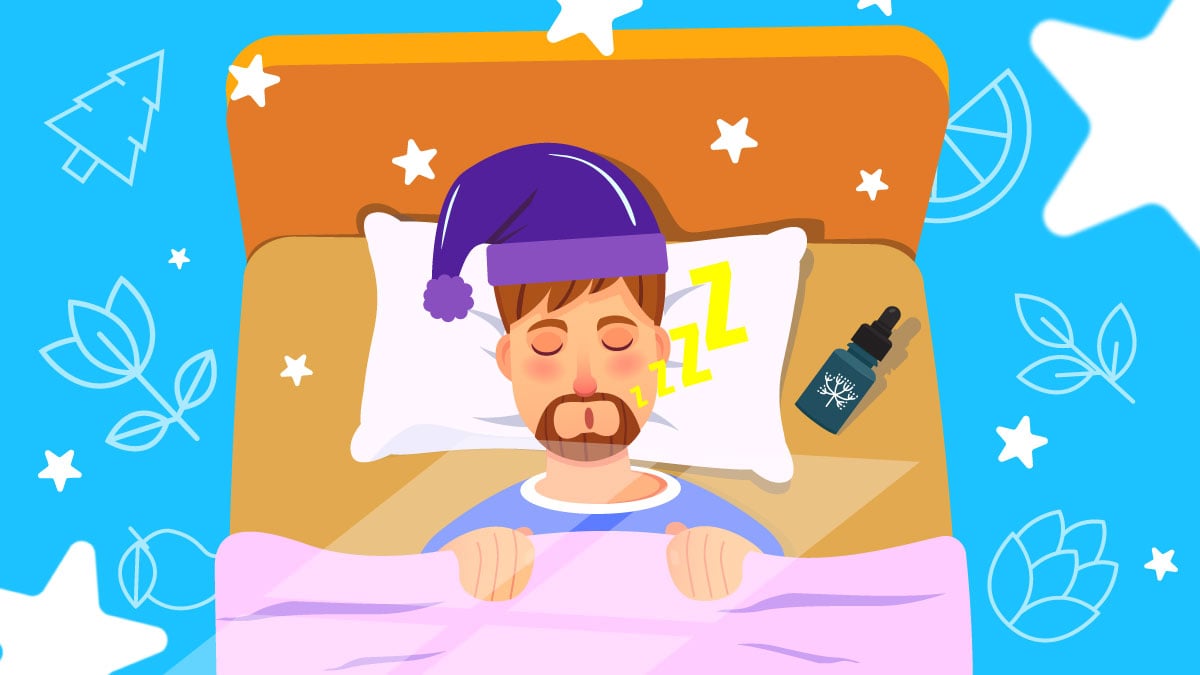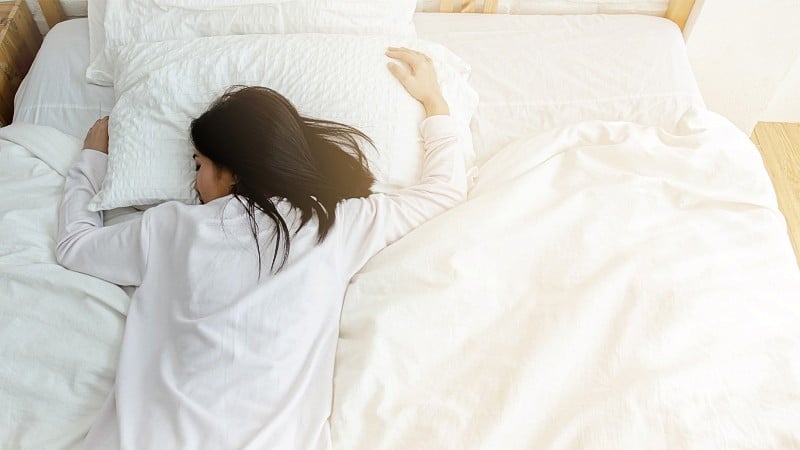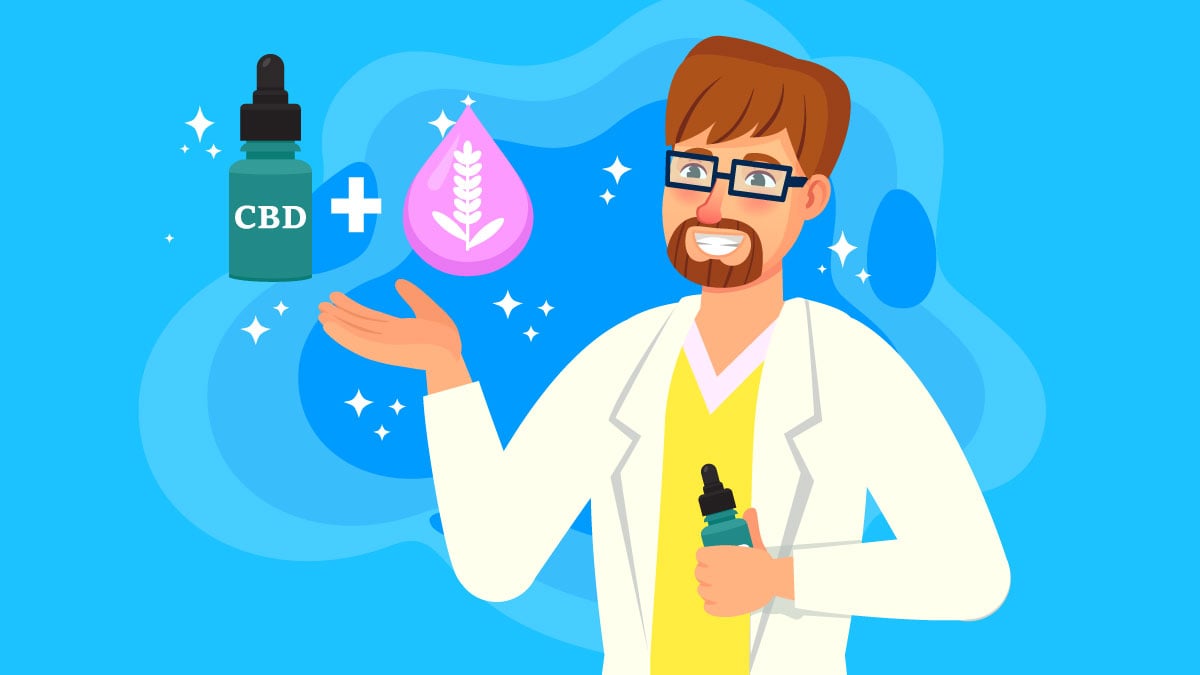Terpenes for Sleep: Does It Help & Which Strain to Choose?

Terpenes are active compounds that provide plants with security and protection from high temperatures, predators, and unwanted pests. They also give plants, herbs, spices, and flowers their unique and captivating aromas and flavors.
The more terpenes are studied, the more we learn more about their potential benefits.
While there’s plenty more to learn, some interesting research has come to light demonstrating the sleep-supportive benefits of certain terpenes.
What Are Terpenes?
Terpenes play a huge role in plants, especially when it comes to their ability to survive. Terpenes not only repel predators and unwanted insects and animals but are also responsible for attracting pollinators.
Some act as a protector of the plant, helping it recover from damage quickly. Others work as a part of the plant’s immune system, keeping away unwanted germs or other threats.
Because of their impact, we use terpenes every day in the form of teas, herbs, spices, essential oils, and more.
We know they greatly impact a plant’s health, but how do they affect humans, and how can some promote relaxation?
Can Terpenes Help You Relax?
Absolutely. However, it depends on which terpenes you use.
Each terpene has a unique chemical structure, and therefore, some terpenes are going to be better for sleep versus others.
Some terpenes do a great job calming the mind and the body, reducing stress, inducing relaxation, and encouraging restful sleep, while others are more uplifting.
Combining multiple terpenes is sometimes more effective than using a terpene isolated by itself, creating a greater sense of relaxation and sleep support.
Certain terpenes in cannabis and other botanicals have these calming effects, but there are seemingly no differences in the properties of cannabis-derived terpenes compared to botanically-derived terpenes; terpenes from other plants are equally beneficial.
The Best Terpenes for a Good Night Sleep
Terpenes are still studied for their various beneficial properties.
While their exact physiological effects vary, most are sedatives or stimulants. If you’re looking for a terpene to help you get a good night’s rest, take a look at our list of the best terpenes for sleep.
1. Caryophyllene
Caryophyllene is the only one out of hundreds that bind directly to the cannabinoid receptors found throughout the body. This potent terpene is thought to soothe inflammation, physical pain, and anxiety — a recipe for great sleep.
This terpene may be suitable for someone who experiences racing thoughts at night due to stress and anxiety.
It has a pungent, spicy, pepper-like aroma and is common in cannabis cultivars, as well as black pepper, cloves, and cinnamon.
Cannabis Strains That Contain Caryophyllene:
- Death Star
- Candyland
- The White
- Master Kush
- Girl Scout Cookies
- Lavender
2. Nerolidol
Nerolidol is a more mild terpene that possesses sedative qualities. It’s also thought to possess anti-inflammatory and analgesic properties. If sore joints and muscles are what keep you awake at night, this terpene may be of help.
It has a woody, earthy, bark-like aroma. This subtle terpene is common in lemongrass, tea tree, ginger, lavender, and jasmine.
Cannabis Strains That Contain Nerolidol:
- Island Sweet Skunk
- Blue Dream
- Bubba Kush
- Chem Dawg
- Jack Herer
- Skywalker OG
3. Myrcene
By far, the most abundant terpene in cannabis is myrcene. Some suggest it’s good for sore muscles and general sedation, making it easy for you to get comfortable at night. This terpene is ideal for individuals who are tense and wound-up, as it may be able to help you unwind and relax.
This terpene has a fruity, herb-like fragrance and in mangoes, thyme, cardamom, and hops. Not only is myrcene abundant in cannabis, but it’s also just as common in your favorite brews.
Cannabis Strains That Contain Myrcene:
- Purple Kush
- Granddaddy Purple
- OG Kush
- Grape Ape
- Tangie
- Remedy
4. Linalool
Have you ever seen lavender essential oils that claim to help promote restful sleep? Or how about those silk pillows that are full of lavender buds? Well, that’s because lavender is rich in linalool.
Linalool is responsible for helping ease anxiety and stress and boosting moods. If it’s your mental health that’s preventing you from falling asleep, it won’t hurt to try linalool to see if it works for you.
Linalool has a floral aroma and is prevalent in lavender, sweet basil, clary sage, and mint. It’s also very common in cannabis.
Cannabis Strains That Contain Linalool:
- LA Confidential
- Scooby Snacks
- OG Shark
- Amnesia Haze
- Lavender
- Purple Kush
5. Pinene
Pinene comes in two different forms, there is alpha and beta-pinene. These two cause different effects on the body and mind. If it’s the relaxation and tranquility you’re looking for, opt for alpha-pinene. This terpene supposedly has properties that offer strong relief for both physical and mental strain.
It offers a fresh, woodsy aroma reminiscent of a pine forest (as the name implies.) is common in rosemary, parsley, and orange peels.
Cannabis Strains That Contain Pinene:
- UW
- God’s Gift
- Harlequin
- Big Smooth
- Blue Dream
- Bubba Kush
6. Terpinolene
Terpinolene is abundant in many cannabis strains but in much smaller amounts compared to myrcene. This terpene helps you feel drowsy, so if you struggle with a hyperactive mind as soon as you hit the sheets, terpinolene may be the terp for you.
This terpene has a fresh, pleasant fragrance, similar to a combination of lilac, pine, and citrus. Besides cannabis, it’s also in lilacs, nutmeg, apples, and cumin.
Cannabis Strains That Contain Terpinolene:
- Golden Pineapple
- Super Lemon Haze
- Dutch Treat
- Sensi Star
- Clementine
- Ace of Spades
Why Is Sleep Important?
Everyone needs sleep to function; it’s a vital part of our physical and mental health. This period of rest is essential to repair tissue and rejuvenate the mind.
Sleep affects almost every single tissue in the body, affecting growth and stress hormones, the immune system, our appetites, blood pressure, and cardiovascular health. Experts recommend 7-9 hours of sleep each night, but one-third of the population doesn’t get enough.
Lack of sleep may increase the risk for heart disease, obesity, and other complications, including an increased risk of mental distress.
Sleep disorders manifest from a variety of underlying issues, such as mental health problems like anxiety, stress, and depression. Physical ailments like chronic pain can also hinder sleep. Clearly, what we have available in terms of pharmaceuticals and OTC sleep aids are not cutting it.
Is there something possibly more effective, something more natural, that can be used as a sleep aid? This is where terpenes come in.
If you’re unsure what the root of the issue is, you should speak to your doctor first. Understanding the reason behind your poor sleep habits may give you insight into what terpenes can best benefit you.
Key Takeaways: Can Terpenes Help With Sleep?
You can always go for a terpene-rich cannabis strain and take advantage of the entourage effect, or you can purchase terpene isolates in a variety of forms. Fortunately, you don’t have to smoke weed to take advantage of terpenes and their sleep-promoting benefits.
You may also want to utilize terpenes in conjunction with a relaxing bedtime routine. Possibly pick up one of those lavender-filled pillows we mentioned, practice relaxing breathing techniques, meditate, or have a cup of chamomile tea. There are many things you can try in addition to adding terpenes to your regime.
Next time you are lying awake in bed tossing and turning, whether from physical discomfort or mental distress, consider trying terpenes. That way, you can see if they can help reduce the problem and get you back to sleep.
References Used
- Cappiello, F., Loffredo, M. R., Del Plato, C., Cammarone, S., Casciaro, B., Quaglio, D., … & Ghirga, F. (2020). The revaluation of plant-derived terpenes to fight antibiotic-resistant infections. Antibiotics, 9(6), 325.
- Downer, E. J. (2020). Anti-inflammatory Potential of Terpenes Present in Cannabis sativa L. ACS chemical neuroscience, 11(5), 659-662.
- Kim, T., Song, B., Cho, K. S., & Lee, I. S. (2020). Therapeutic potential of volatile terpenes and terpenoids from forests for inflammatory diseases. International journal of molecular sciences, 21(6), 2187. [1]
- Woo, J., & Lee, C. J. (2020). Sleep-enhancing effects of phytoncide via behavioral, electrophysiological, and molecular modeling approaches. Experimental Neurobiology, 29(2), 120. [2]
- ”Kim, J. C., Dinh, T. V., Oh, H. K., Son, Y. S., Ahn, J. W., Song, K. Y., … & Kim, K. H. (2019). The potential benefits of therapeutic treatment using gaseous terpenes at ambient low levels. Applied Sciences, 9(21), 4507.
- Yatagai, M. (2000). Tree aroma and its function on relaxation and rest. Aroma Research, 1(1), 2-7.
- LaVigne, J., Hecksel, R., & Streicher, J. M. (2020). In defense of the “Entourage Effect”: Terpenes found in Cannabis sativa activate the Cannabinoid Receptor 1 in vivo. The FASEB Journal, 34(S1), 1-1. [3]
- Shoker, R. M. (2020). A Review Article: The Importance of the Major groups of Plants Secondary Metabolism Phenols, Alkaloids, and Terpenes. International Journal for Research in Applied Sciences and Biotechnology, 7(5), 354-358.
- Sharma, C., M Al Kaabi, J., M Nurulain, S., N Goyal, S., Amjad Kamal, M., & Ojha, S. (2016). Polypharmacological properties and therapeutic potential of β-caryophyllene: a dietary phytocannabinoid of pharmaceutical promise. Current pharmaceutical design, 22(21), 3237-3264. [4]
- Javed, H., Azimullah, S., Khair, S. B. A., Ojha, S., & Haque, M. E. (2016). Neuroprotective effect of nerolidol against neuroinflammation and oxidative stress induced by rotenone. BMC neuroscience, 17(1), 1-12.
- Jansen, C., Shimoda, L. M. N., Kawakami, J. K., Ang, L., Bacani, A. J., Baker, J. D., … & Turner, H. (2019). Myrcene and terpene regulation of TRPV1. Channels, 13(1), 344-366. [5]
- Soulimani, R., & Joshi, R. K. (2020). Toxicological aspects and pharmaco-therapeutic properties of linalool, a natural terpene derivative of essential oils: Literature studies. American Journal of Essential Oils and Natural Products, 8(4), 24-34.
- Him, A., Ozbek, H., Turel, I., & Oner, A. C. (2008). Antinociceptive activity of alpha-pinene and fenchone. Pharmacologyonline, 3, 363-369.
- Ito, K., & Ito, M. (2013). The sedative effect of inhaled terpinolene in mice and its structure-activity relationships. Journal of natural medicines, 67(4), 833-837.
- Consensus Conference Panel, Watson, N. F., Badr, M. S., Belenky, G., Bliwise, D. L., Buxton, O. M., … & Tasali, E. (2015). Recommended amount of sleep for a healthy adult: a joint consensus statement of the American Academy of Sleep Medicine and Sleep Research Society. Journal of Clinical Sleep Medicine, 11(6), 591-592.
- Blackwelder, A., Hoskins, M., & Huber, L. (2021). Peer-Reviewed: Effect of Inadequate Sleep on Frequent Mental Distress. Preventing Chronic Disease, 18.


